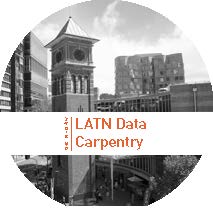What is it?
Scholarship is changing. New kinds of research techniques are being made possible by an ever more enveloping digital research infrastructure. But working with software and data isn’t always easy. There’s a lot of it, and its utility is highly variable.
Academic research libraries are well positioned to help researchers adapt to the demands of digital scholarship. They have already provided leadership in the development of research data services, offering researchers and faculty advice about techniques, technologies and methods for the discovery, integration, application, and presentation of data, as well as the availability of institutional and secondary infrastructures to support its use. Academic Libraries have recognised the need to build capacity in this area so that they can extend existing research data services to suit the evolving needs of their communities.
The need for data and software related training has prompted new training initiatives aimed at improving librarians’ familiarity with digital scholarship and its contingent infrastructure. These include the British Library Internal Digital Scholarship Training Programme 2012-, Data Scientist Training for Librarians (DST4L) 2013-, Dr James Baker’s Library Carpentry UK 2015, AU Library Carpentry Belinda Weaver ResBaz Brisbane February 2016, 23 Things: Libraries for Research Data 2015-).
Library data Carpentry (LibDC) is a workshop that builds on the work of these initiatives. The LibDC program has been designed to familiarise Librarians with the practice of digital scholarship and the data science lifecycle, with a focus on skills like software based techniques for data extraction, analysis, and visualization. Research from go to whoa, as it were. Its target audience are those in data-librarian-like roles in member institutions of the Libraries of the Australian Technology Network (LATN) and Council of Australian University Librarians (CAUL). Training will be elementary in an effort to balance the expertise of those attending.
LibDC will span three days, from July 12-14 2016 and involve roughly 35 participants.
See the about page for more detail!
